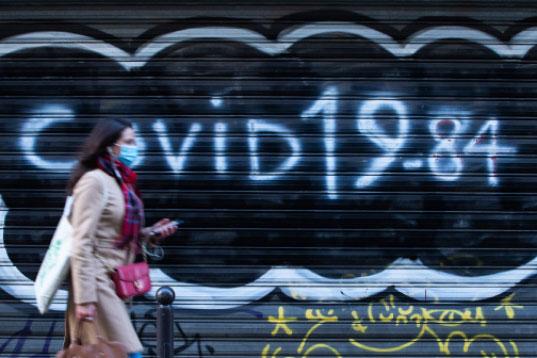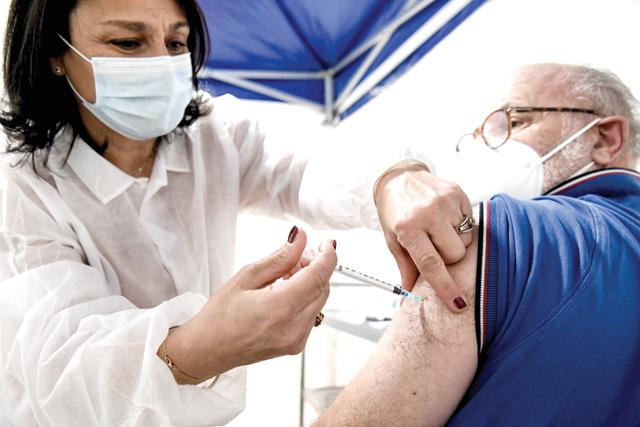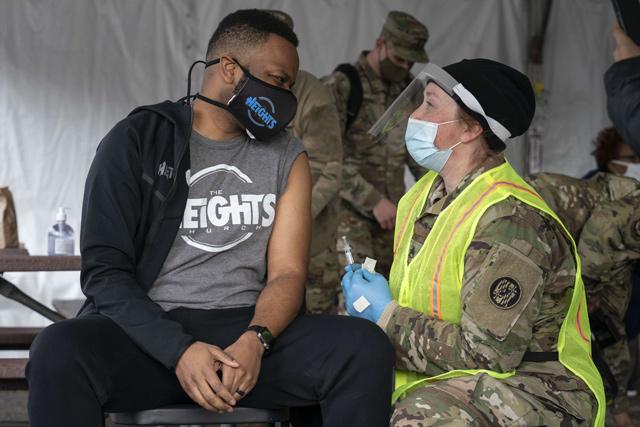You are here
Germany battles soaring virus deaths as Biden makes vaccine vow
By AFP - Dec 09,2020 - Last updated at Dec 09,2020

A passenger who just landed from New York on an Alitalia flight undergoes a rapid antigen swab test for COVID-19 on Wednesday at a testing station set up at Rome's Fiumicino airport (AFP photo)
BERLIN/ BEIJING — Germany was battling a second virus wave much more deadly than the first on Wednesday with record fatalities, as Joe Biden pledged to inoculate 100 million people in his first 100 days as US president.
German Chancellor Angela Merkel is urging regions to take much more drastic action to curb the spread, after state leaders agreed measures that would see comparatively modest social restrictions eased even further for the Christmas holidays.
The darkening mood in Germany was in stark contrast to the joy ushered in by Britain doling out the first approved jabs in the Western world on Tuesday.
Both Russia and China have already begun inoculation campaigns with domestically produced vaccines and the United States is expected to grant emergency authorisation soon to the Pfizer-BioNTech jab — the same one used in Britain.
Israel accepted its first shipment of the Pfizer vaccine on Wednesday, with Prime Minister Benjamin Netanyahu promising to be the first to be injected — though it has yet to pass regulatory hurdles.
“What is important to me is that Israeli citizens get vaccinated,” he said. “I want to serve as an example to them.”
The virus has now killed more than 1.5 million worldwide since it emerged in China late last year.
Change ‘for the better’
Merkel has been in no mood for celebration, repeatedly urging local leaders who have responsibility for health policies to clamp down more strongly — Germany’s death toll hitting a new high of 590 on Wednesday.
“If we have too many contacts before Christmas and it ends up being the last Christmas with the grandparents, then we’d really have failed,” she said.
Two weeks ago, Germany’s states agreed rules limiting social mixing to five people but agreed to double the limit to 10 for the holiday season — something Merkel argued against.
The United States is also mired in political rows over an epidemic that has killed more than 280,000 — the world’s worst toll.
President Donald Trump signed an executive order on Tuesday that sought to guarantee access to vaccines for all Americans, but critics immediately queried what legal force it could have as drug firms have already signed contracts with other countries.
Biden, who will take over from Trump in January, urged Congress to come up with funding to stop the virus response from stalling, and unveiled his plan for 100 million jabs in his first 100 days.
“I’m absolutely convinced that in 100 days, we can change the course of the disease and change life in America for the better,” he said on Tuesday.
Hunger the bigger fear
Merkel was not the only one issuing dire warnings — UN rights chief Michelle Bachelet telling reporters that the pandemic had zeroed in on fissures in societies and had exposed “all our failures to invest in building fair and equitable societies”.
Proving her point, experts are warning that hunger in the Philippines has reached new levels thanks in part to restrictions that have crippled the economy and left many without livelihoods.
“If you go out there everybody will tell you that they’re more afraid of dying from hunger than dying from COVID,” said Jomar Fleras of the Rise Against Hunger NGO.
And there were dark warnings too for democracy, with a Swedish-based watchdog saying more than 60 per cent of countries had put in place anti-democratic measures during the pandemic.
Kevin Casas-Zamora of International IDEA told AFP he expected authoritarian governments to act in this way but added: “What is more surprising is that so many democracies have adopted measures that are problematic on the standpoint of democracy and human rights.”
Even countries trying to push forward with democratic processes have faced criticism — Indonesia being the latest to hold elections against the advice of experts.
“Health is being trumped by political demands and that’s very concerning. It’s not worth it,” said Hermawan Saputra of the Indonesian Public Health Experts’ Association.
Meanwhile, China has tested more than a quarter of a million people for the coronavirus after a handful of new cases were detected in the southern city of Chengdu.
An elderly couple were diagnosed as confirmed cases on Monday, and authorities have been tracing their close contacts and testing food samples.
Local health officials said the virus was detected on food stored in their fridge and on a chopping board in their flat.
As of Tuesday 255,200 residents in the city had been swabbed for COVID-19 tests, the municipal health commission said, with six confirmed cases and one asymptomatic patient.
Schools and kindergartens in the Pidu district where the cases emerged have closed, according to local authorities, with students and teachers to quarantine and be tested for the virus.
China — where the virus first surfaced late last year — has largely brought domestic transmissions under control, with state media blaming recent clusters on imports of frozen food and other shipments.
The World Health Organisation says there is currently no evidence that people can catch COVID-19 from food or food packaging.
Almost a year after the virus first emerged in the central city of Wuhan, China is stepping up a campaign to question its origins.
A Tianjin health official said in November that the city’s infections had been traced to imported cold chain products such as pig heads from north America, saying the virus strains found were similar to those in Europe and the US.
Related Articles
THE HAGUE — Documents related to the Pfizer coronavirus vaccine were illegally accessed during a cyberattack at the EU regulator, the compan
ROME — The Pope and Britain's Queen Elizabeth became the latest high-profile figures to join the global vaccination campaign against the cor
GENEVA — The World Health Organisation(WHO) on Friday called on vaccine makers to dramatically boost production, as US President Joe Biden w


















